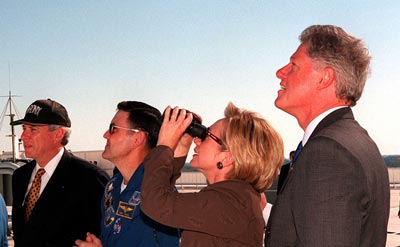Lost in space: Bill Clinton’s memoirs and the non-importance of spaceby Dwayne A. Day
|
| One thing that members of the space community should not be surprised by, however, is that Clinton expends almost no words discussing space exploration, NASA, or anything related to it. |
Despite the length of the book, there are many subjects that Clinton virtually ignores. As critics have noted, the book is filled with trivia and short on substance. The second half of the book, dealing with Clinton’s eight years as president, is rushed and haphazard. He spends remarkably little time on some major events in his presidency. This is a shame, because Clinton is well-known as a policy wonk who loves discussing government affairs, and only his shallowest enemies (of whom there are many) would ever accuse him of being stupid.
One thing that members of the space community should not be surprised by, however, is that Clinton expends almost no words discussing space exploration, NASA, or anything related to it. I have not read the book and have no real desire to. The index is incomplete and remarkably unhelpful, so finding references to space is not easy. So far, this is the only discussion of space that I have found, on page 785:
At around that time, I also flew to the Johnson Space Center in Houston to discuss our newest shuttle mission to conduct twenty-six experiments on the impact of space on the human body, including how the brain adapts and what happens to the inner ear and the human balance system. One of the crew was in the audience, seventy-seven-year-old senator John Glenn. After flying 149 combat missions in World War II and Korea, John had been one of America’s first astronauts more than thirty-five years earlier. He was retiring from the Senate and was itching to go into space once more. NASA’s director, Dan Goldin, and I were strongly in favor of Glenn’s participation because our space agency wanted to study the effects of space on aging. I had always been a strong supporter of the space program, including the International Space Station and the upcoming mission to Mars; John Glenn’s last hurrah gave us a chance to show the practical benefits of space exploration.
It is probably not worth parsing this paragraph. John Glenn’s flight was not really about aging. It was either a great publicity stunt both for him and NASA, or, if you are conspiratorially minded (I am not) payback for Glenn’s support of Clinton during the impeachment saga. But one wonders what Clinton means when he says that he supported “the upcoming mission to Mars.” What Mars mission?
As for Clinton claiming that he was “a strong supporter of the space program,” this is barely worth noting. All presidents claim to be strong supporters of the space program, even when, like Clinton, they cut the budget.
Clinton’s lack of attention to space in his memoir is not surprising or unusual. Presidents, by the nature of their job, cannot spend much time, energy, or political capital on space issues. Even if they were inclined to do so—and they are not—they have too many other demands on their time. NASA’s budget is less than one percent of the federal budget and gets about the same amount of presidential attention. Dwight Eisenhower devoted about a dozen pages of his memoir, Waging Peace, to discussing Sputnik and NASA. Lyndon Johnson spent ten pages of his memoir, The Vantage Point, discussing space during his senatorial, vice presidential and presidential terms. Richard Nixon devoted only two pages of his memoirs to discussing Apollo 11 and NASA. The downward trend continued for other presidential memoirs. Space is nowhere near as important today as it was during the Cold War.
| Clinton’s lack of attention to space in his memoir is not surprising or unusual. Presidents, by the nature of their job, cannot spend much time, energy, or political capital on space issues. |
But NASA underwent profound changes under Bill Clinton’s presidency. As part of Clinton’s foreign policy effort the space agency formed an alliance with the Russians on the space station program—probably the one area where the ISS could be declared successful. Clinton’s White House sought to find a replacement for Dan Goldin and failed, after offering the job to numerous people. NASA’s budget was cut substantially and the agency also briefly became the poster child for government reform. And in the middle of Clinton’s presidency NASA scientists announced that they found evidence of past life on Mars. That announcement is now generally regarded as inaccurate, but it was certainly important. Even if he had written about these events, it is unlikely he would have shed much light on them, because that is the nature of presidential memoirs.
If we are lucky, a historian with an interest in these matters will someday sit down with the former president and ask him about them. And if we are really lucky, Clinton might actually have something interesting to say.
